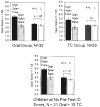Working Memory Spans as Predictors of Spoken Word Recognition and Receptive Vocabulary in Children with Cochlear Implants
- PMID: 21666765
- PMCID: PMC3111028
Working Memory Spans as Predictors of Spoken Word Recognition and Receptive Vocabulary in Children with Cochlear Implants
Abstract
The present study investigated whether individual differences in working memory could account for a significant proportion of the variance in the open-set word recognition and receptive vocabulary skills of prelingually deafened, pediatric cochlear implant recipients, after the contribution of known predictors was taken into account. The contributions of four measures of working memory were examined separately for children using oral communication (OC) (n = 32) and Total Communication (TC) (n = 29). Wechsler Intelligence Scale for Children-Third Edition (WISC) digit-spans, requiring immediate recall of auditory-only lists in both forwards and backwards directions were, collected. Two versions of a novel "memory span game" were also administered: One required memory for sequences of colored lights; the other assessed memory for colored lights presented in conjunction with auditory color-names. A contribution from working memory was observed only for the span tasks that incorporated an auditory processing component. These results suggest a relationship between working memory and the examined outcome measures that is specific to the auditory modality, partially linked to communication mode, and not related to individual differences in a general-purpose component of working memory.
Figures
References
-
- Archbold SM. Educational implications of cochlear implantation—Conflict or collaboration. In: Waltzman SB, Cohen NL, editors. Cochlear implants. New York: Thieme; 2000. pp. 257–265.
-
- Baddeley AD. Working memory. Science. 1992;255:556–559. - PubMed
-
- Baddeley AD. Human memory: Theory and practice. Boston: Allyn and Bacon; 1998. (Rev. ed.)
-
- Blamey PJ, Sarant JZ, Paatsch LE, Barry JG, Bow CP, Wales RJ, et al. Relationships among speech perception, production, language, hearing loss, and age in children with impaired hearing. Journal of Speech, Language, and Hearing Research. 2001;44:264–285. - PubMed
Grants and funding
LinkOut - more resources
Full Text Sources

